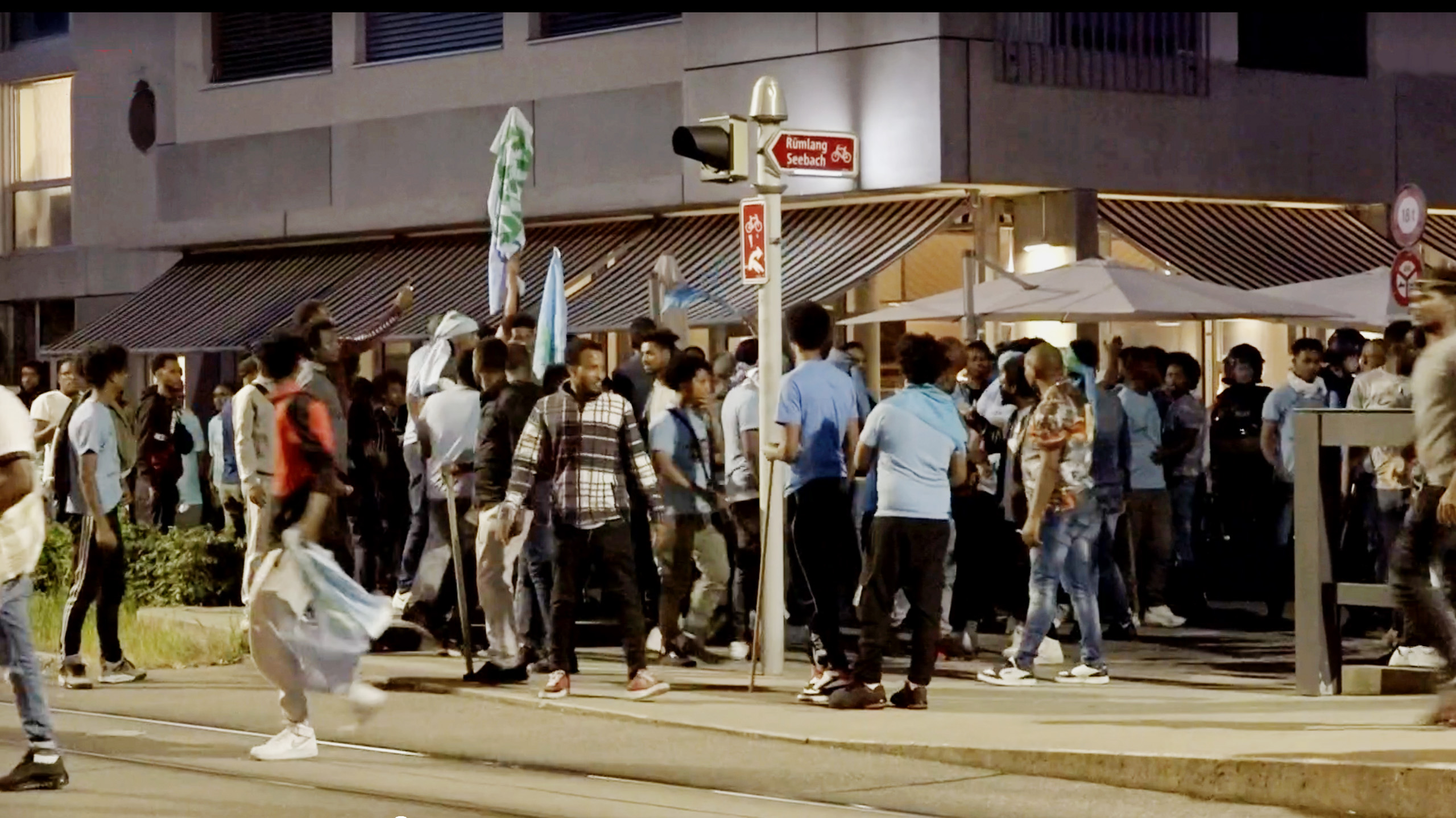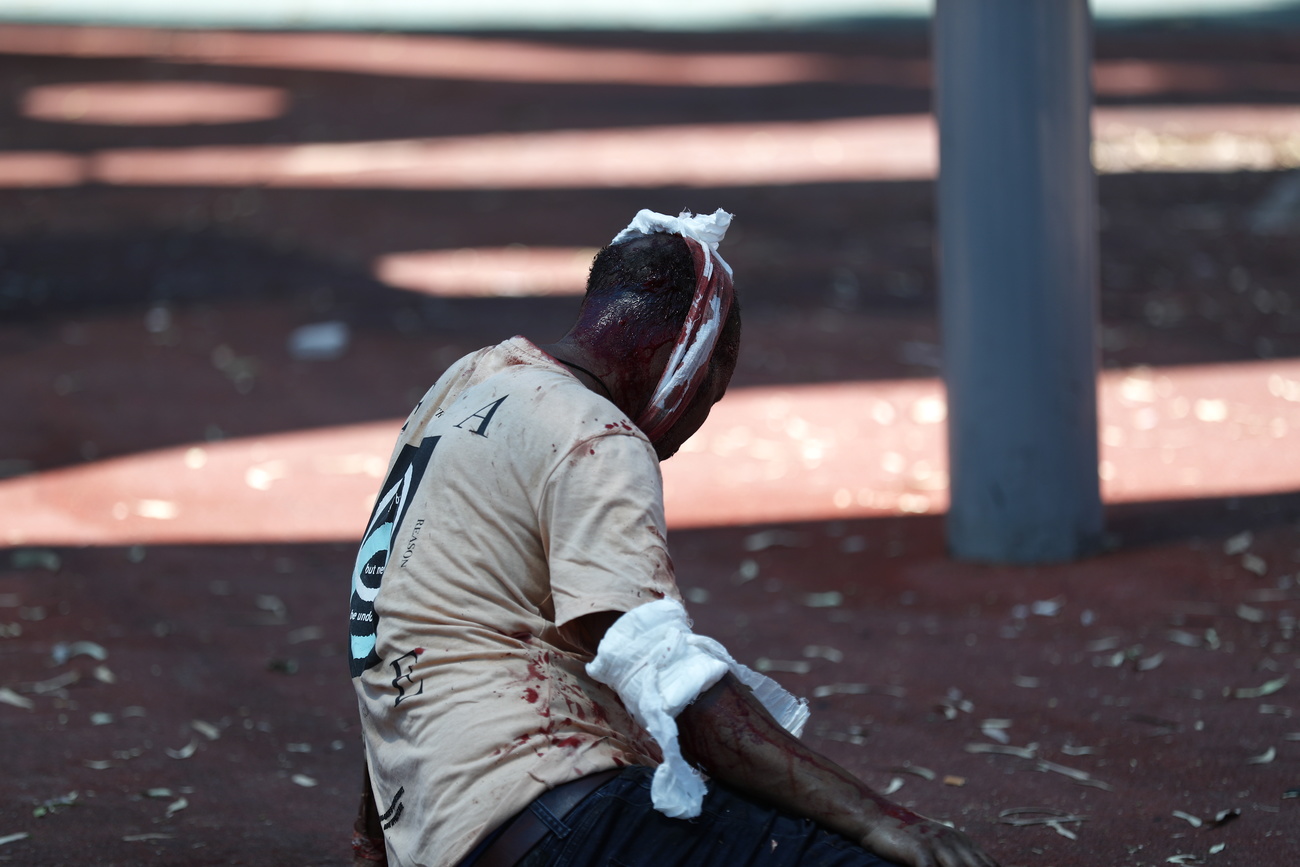
Explainer: the flare-up in clashes among Eritreans in Switzerland

Clashes between supporters and opponents of the Eritrean regime erupted in several countries this summer. Tempers flared most recently in Switzerland, home to a large Eritrean diaspora that does not always see eye-to-eye on politics in their country of origin.
Around 200 Eritreans faced off in Opfikon, a municipality near Zurich, on September 2. The confrontation prompted a major police operation and left at least 12 people injured.
The incident was far from isolated. The same day, clashes unfolded in Norway and Israel. All of them came on the heels of the anniversary of the start of war of independence on September 1, 1961, and as Eritrean President Isaias Afewerki celebrates 30 years in power. And all featured two groups: those who support Afewerki’s regime and those who oppose it.
Switzerland a destination of choice
Hailed as a hero of Eritrean independence when he first became ruler in 1993, Afewerki has since been accused of leading a repressive dictatorship where, in the wordsExternal link of the Swiss Refugee Council, “human rights violations are the order of the day”. The country has no legislature or independent judiciary. Men and women are forcibly rounded up to serve indefinitely in the military, with draft evaders often jailed and tortured, rights groups say. A policy of sending political opponents and journalists to prison began 20 years ago.
Rights groups also claim that the Eritrean army has committed war crimes against civilians during an ongoing conflict in the Tigray region across the border in Ethiopia.
For the thousands of Eritreans fleeing their country each year, Switzerland became a destination of choice in Europe primarily because of its proximity to Italy, the first country of arrival for Eritreans crossing the Mediterranean.
From a high of over 39,000 Eritreans making the sea crossing and landing in Italy in 2015, the following year just over 20,000 did the same. Consequently the number of Eritreans seeking asylum in Switzerland also dropped, going from 9,950 applications in 2015 to just 1,830 in 2022.
Most of the decisions in 2022 were to grant either asylum or temporary admission to Eritreans, for a protection rate of 85%.
Simmering tensions in the diaspora
Today the Eritrean Media Association Switzerland (EMBS), a group that aims to facilitate Eritreans’ participation in public discourse, saysExternal link over 40,000 Eritreans live in Switzerland, although the Swiss foreign ministry put the number at 31,722 at the end of 2020.
Only a small minority of these residents profess either support for, or opposition to, the current Eritrean regime, the Swiss government saidExternal link in 2022 in response to questions from parliament. How many Eritreans are pro-Afewerki is unknown but, the government said, most of them arrived in Switzerland before 1993.
Members of this older generation, the NZZ MagazinwroteExternal link, still consider the president a hero and freedom fighter. Those who arrived in Switzerland in the 2000s, on the other hand, see things differently, having experienced life under Afewerki’s rule. They argue that cultural Eritrean festivals organised in Europe are “propaganda events” used to raise donations for the regime. Last year such a festival held in canton Valais featured senior officials flown in from Eritrea, the NZZ reported, with the Eritrean ambassador acting as host of the event.
An Eritrean festival had been planned in canton St. Gallen last Saturday but was cancelled by the organisers at the last minute because of the risk of violence. Many of the pro-regime participants then reportedly headed to OpfikonExternal link, where they clashed with opponents. A similar festival had been planned in Rüfenacht, near Bern, but it too was cancelled for security reasons, Keystone-SDA reported.

In addition to violent confrontations in Bergen, Norway and Tel Aviv, Israel last weekend, clashes occurred in Giessen, Germany and Stockholm, Sweden earlier this summer. Most of these incidents occurred around Eritrean festivals, with dozens of injuries reported in each case. Such is the risk of violence arising from these events that the Netherlands has banned them.
Okbaan Tesfamariam, a spokesperson for the EMBS, told Keystone-SDA that the increase in violence is the result of the growing number of festivals being organised as part of the so-called “propaganda tour”. Tensions between opponents of the regime and those loyal to it have been simmering for decades, he added, and many Eritreans feel pressure to donate money to the regime.
The Eritrean embassy in Geneva did not respond to a SWI swissinfo.ch request for comment on these allegations.
High-level contacts – but no forced returns
For its part, the Swiss government in 2022 said that it can only “assume that […] privately organised festivals often represent a source of foreign exchange for the Eritrean government,” but that it had no information on how much money was collected at these events and sent to Eritrea. It also indicated there was no legal basis for stripping asylum from Eritreans who choose to take part in pro-regime events, as one Radical-Liberal parliamentarian had suggested.
Still, Bern has not been immune to criticism. After 2016, it no longer granted asylum solely on the grounds that Eritreans left their country illegally, a policy that was backedExternal link by the Federal Court but decried by refugee groups. The court also decided that imminent conscription in Eritrea did not in principle prevent a rejected asylum-seeker from being deported.
The Swiss also received some flak for meeting with Yemane Gebreab, the special adviser to the Eritrean president – and reportedly the second most-powerful man in Eritrea – when he travelled to the Swiss capital in October 2021. There he met with State Secretary Livia Leu and the then-head of the migration secretariat, Mario Gattiker. The foreign ministry told the NZZ the Swiss had “urgently” raised the need for compliance with international humanitarian law in the context of the war in Tigray.
But the Swiss also raised the issue of enforced returns during that meeting. Switzerland has not been able to carry out removals because Eritrea refuses to accept non-voluntary returns from any country, a situation that persists despite Switzerland’s high-level interventions.

In compliance with the JTI standards
More: SWI swissinfo.ch certified by the Journalism Trust Initiative































You can find an overview of ongoing debates with our journalists here . Please join us!
If you want to start a conversation about a topic raised in this article or want to report factual errors, email us at english@swissinfo.ch.